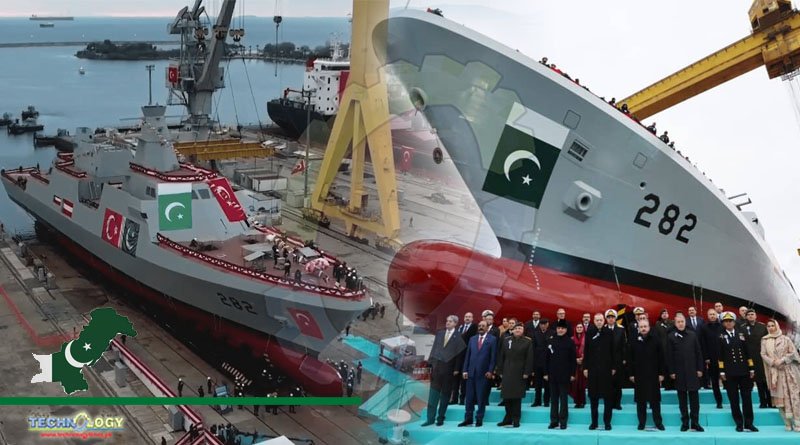Sanctions such as the Pressler Amendment are said to have played a significant role in the Pakistan Navy’s inability to renew the lease and retain such vital assets.

The introduction of new surface vessels in Pakistan is intended to help maintain regional stability. PNS KHAIBAR, the Pakistan Navy’s third Babur Class Corvette, also known as the MILGEM Class, was launched from the Istanbul Naval Shipyard on Friday, November 25, 2022.
Two Babur-class ships, PNS BABUR (built in Turkey) and PNS BADR (built at Karachi Shipyard & Engineering Works), have already been launched. The fourth ship in this class will also be built at Karachi Shipyard.
The contract also includes provisions for the transfer of design rights and construction know-how from Turkey to Pakistan, which makes this manufacturing process unique. This is a significant achievement for Pakistan and demonstrates the evolution of the Pakistan Navy from its humble beginnings in 1947 to a formidable and sustainable fighting force in the twenty-first century.
The MILGEMs will join the naval fleet’s new Tughril Class Frigates, formally known as Type 054A/P frigates. The Tughril Class is a modified derivative of the Chinese Type 054A frigate that was specially tailored to the Pakistan Navy’s operational requirements.
The People’s Liberation Army Navy fleet of surface combatants, which currently consists of 30 vessels, includes the Type 054.
The Tughril Class is well-known for having anti-surface warfare (ASuW), anti-air warfare (AAW), anti-submarine warfare (ASW), and low radar observability. The Tughril Class, which will replace the TARIQ Class Destroyers, is expected to become a pillar of the Pakistan Navy’s surface fleet.
Pakistan has ordered four Tughril-class frigates, all of which have already been launched, with the first two, PNS TUGHRIL and PNS TAIMUR, being commissioned in 2022. The other two ships, PNS Shahjahan and PNS Tipu Sultan, are expected to be commissioned soon.
In addition, the Pakistan Navy will receive two more corvettes from the Galati Shipyard in Romania in the coming years. The ships will be added to the two Yarmook Class corvettes already in service, PNS YARMOOK and PNS TABUK (the ship currently on overseas deployment to Qatar for provision of seaward security to the ongoing FIFA World Cup 2022).
The Pakistan Navy is also working on the Jinnah Class Frigates, which are currently in the final stages of design. The plan is for Karachi Shipyard to build up to six Jinnah-class frigates under a Transfer of Technology (ToT) agreement with Afsat Turkiye. The delivery of six ships is expected to take place between the 2030s and the mid-2040s, with construction beginning after the completion of the Babur-class corvettes.
Former Chief of Naval Staff Admiral Zafar Mahmood Abbasi stated in his change of command address that the Pakistan Navy’s historical size of eight to nine surface vessels greatly limited maritime defence needs and that, in order to eliminate this limitation, the PN will transition to a fleet of more than 50 ships, of which 20 will be “major surface ships.”
The construction of a few of these vessels at Pakistani facilities, as well as Pakistan’s input in the design process, represents a significant achievement for the Pakistan Navy in recent years. Prior to this, the Pakistan Navy relied heavily on foreign nations to design, build, and, on occasion, even maintain surface vessels.
The eight Brooke/Garcia class frigates acquired on lease from the United States are a prime example. Following the expiration of their leases, all of the Brooke/ Garcia-class ships were returned to the US Navy in 1994.
Sanctions such as the Pressler Amendment are said to have played a significant role in the Pakistan Navy’s inability to renew the lease and retain such vital assets.
In a nutshell, these ships will not only assist the Pakistan Navy in becoming a sustainable surface maritime force, but will also serve as a force multiplier.
Pakistan has never been an aggressor in a conflict, instead acting as a responsible and stabilising force in the region, as evidenced by its participation in several task forces that help prevent turmoil in the Arabian Sea and the conduct of the largest maritime exercise in the region, “AMAN,” with the clear goal of enhancing regional peace.
The strengthening of the Pakistan Navy will also be critical for deterrence, particularly in the context of merging geopolitical competition in the Indian Ocean Region, which is supporting the designs of local hegemons such as India.
Originally published at ARY News
